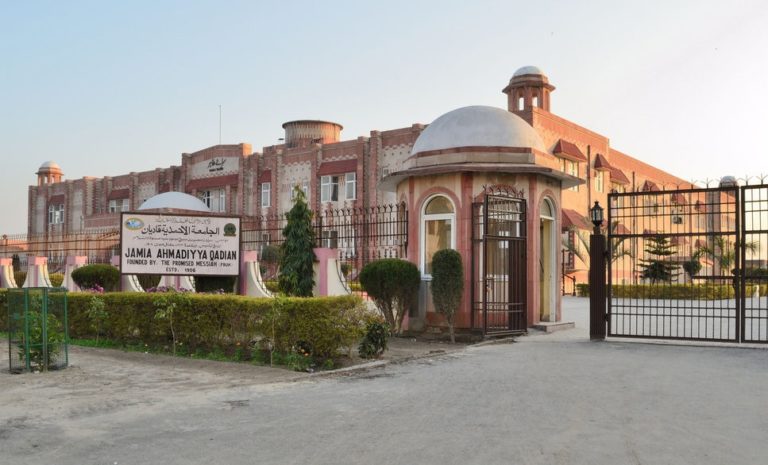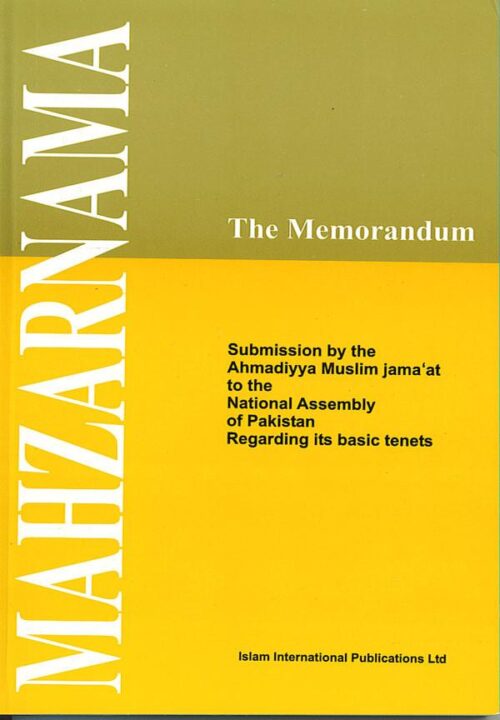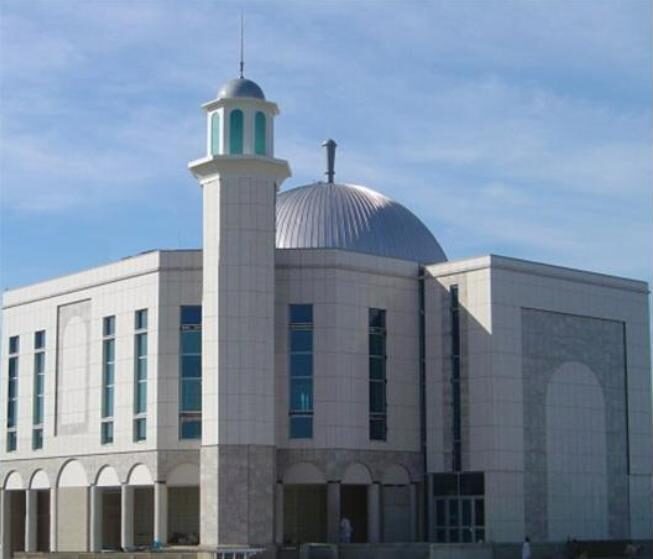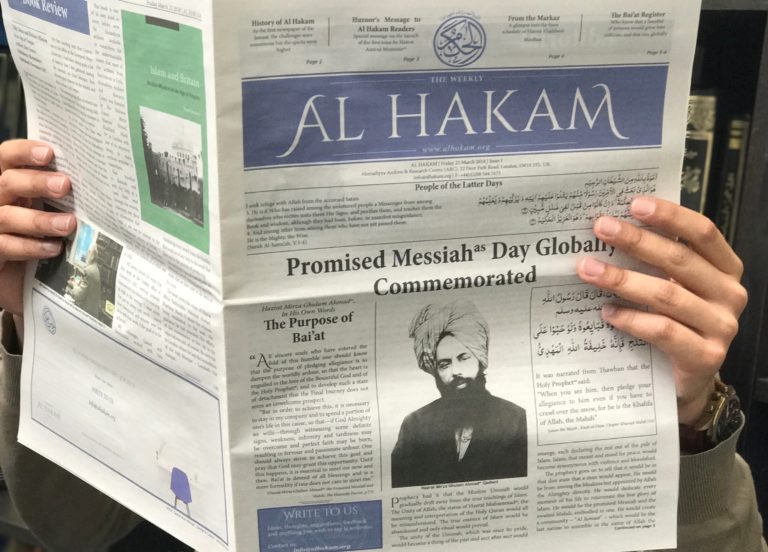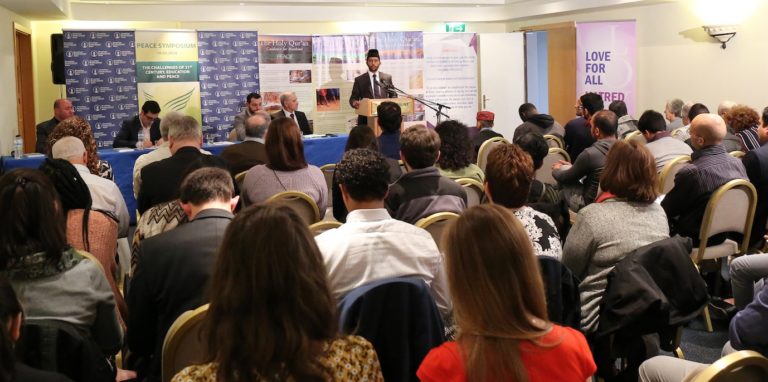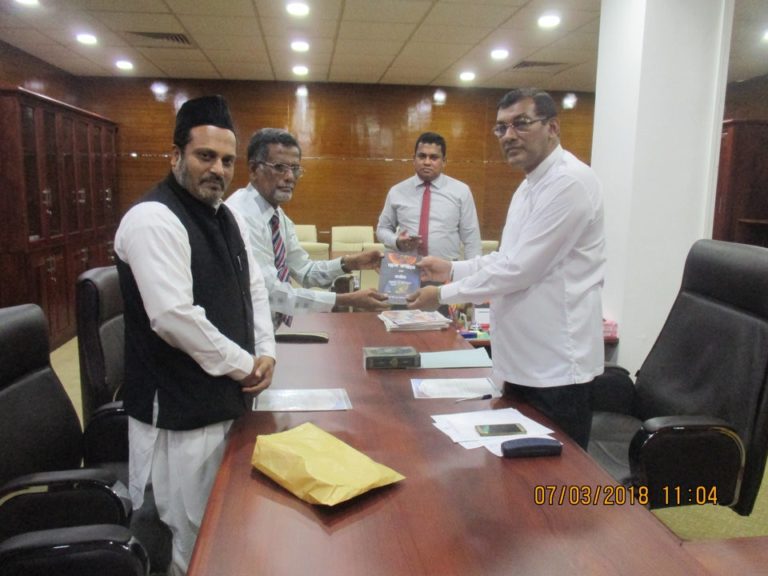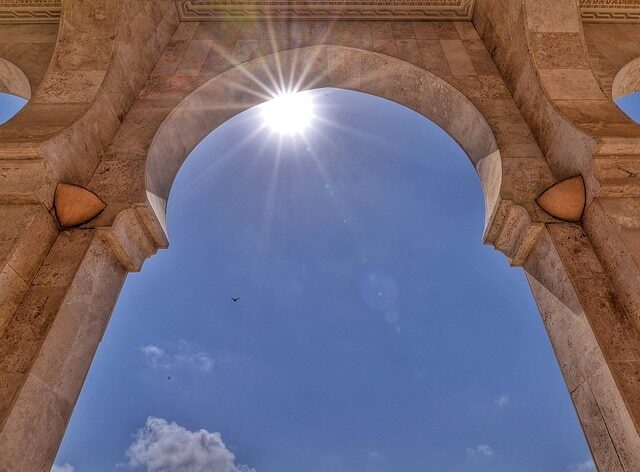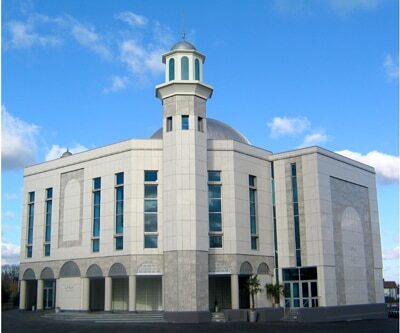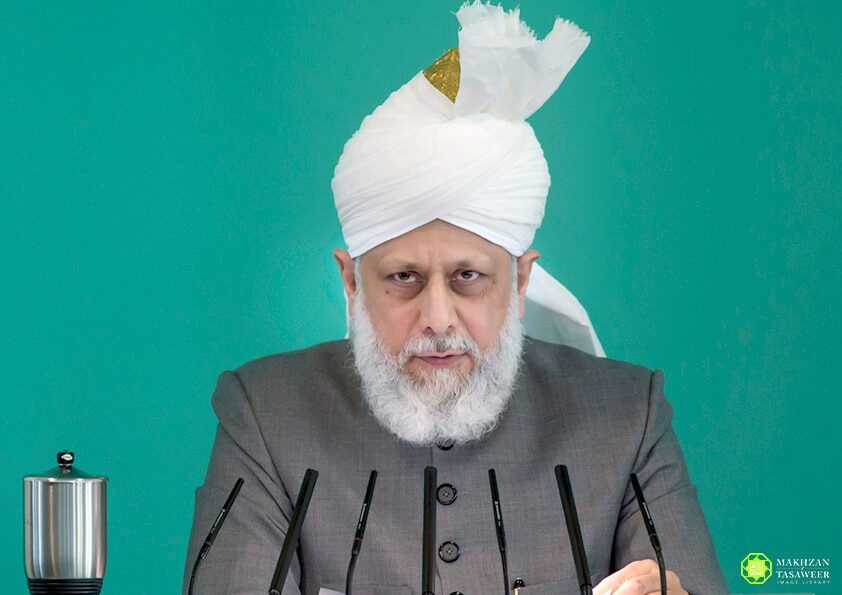Friday Sermon
2 March 2018
The Examples of High Morals
After reciting the Tashahud, Ta’awuz, Tasmiyah and Surah Al-Fatihah, Hazrat Khalifatul Masih Vaa stated:
Adopting excellent morals and showing good manners on every occasion, be it at home, at any level of the society, towards one’s close ones or other people, has been taught by Islam to such an extent that not even the smallest aspect has been left unaddressed. No other religion addresses these matters in such detail.
However, unfortunately, it is Muslims, who are generally considered to be at the lowest level in this regard. Non-Muslims criticise them because their practice is contrary to what they preach. The Holy Prophetsa has not only emphasised this through his practical example but has also, at various occasions, repeatedly emphasised that his ummah achieve the highest moral standards.
Muslims generally claim to love the Holy Prophetsa but there is almost no adherence [among them] to his words or deeds. Due to such a condition of the Muslims, the current state of affairs was bound to arise.
Thus, Allah the Exalted sent the Promised Messiahas but these people refuse to pay heed to this. Rather, some people in certain countries and regions have reached the height of opposition.
They use the most loathsome and vile language against the Promised Messiahas and his followers, while disregarding even the smallest manners or rather sinking themselves lower than a completely immoral person. They are also facing its consequences. As I mentioned, non-Muslims are denouncing them everywhere in the world.
This state of theirs should draw the attention of us Ahmadis towards making utmost efforts to inculcate in us, the most excellent of morals. We should try to adopt the highest morals utilising all our faculties, which is also a teaching of Islam and the practical example of which the Holy Prophetsa established before us and towards which he constantly drew our attention to. Otherwise, it would be of no benefit for us to be “Ahmadis” or of being called so.
If we look at the practical example of the Holy Prophetsa, we see astonishing [moral] standards. If we take a look at his family affairs, we see that, for example, he expressed his utmost displeasure to one of his wives for mocking another’s short height, saying that one should not inflict emotional pain to anyone. (Sunan Abi Dawood, Bab Fil Ghibah, Hadith 4875)
At times [we hear of him] advising one of his wives not to show the slightest displeasure at any of the other wives’ action. (Sunan Ibn Majah, Kitab Al Ahkam, Hadith 2333)
At times [we hear of him him] advising children to raise their moral standard. He said to a child, “You should not throw stones at people’s fruit trees and thereby destroy their ripe or half-ripe fruits. If you are hungry and you cannot bear it anymore, then you may eat the fallen off ripe dates.” However, he also told him, “What would be excellent is that I pray for you that you may never be faced with such a situation where you have to pick up the dates from the floor to eat. May Allah the Exalted continue to provide for you.” (Sunan Abi Dawood, Kitabul Jihad, Hadith 2622)
With this prayer, he drew the attention of the child towards turning to Allah the Exalted for the fulfilment of his needs instead of taking people’s property by using wrongful means. Although, under some circumstances, such things, which are just lying around in excess may become lawful but he said that one should adopt higher morals, which is true righteousness. Furthermore, when a child was eating quickly and moving around his hand around the plate swiftly, he said, “First, recite ‘Bismillah…’, eat with your right hand and eat from what is in front of you.” (Sahih Al-Bukhari, Kitabul Atma, Bab Tasmia ‘Alata‘am, Hadith 5376)
Thus, we should undertake the moral training of children in this manner, so that they grow up to adopt excellent morals.
Furthermore, dishonesty is a sin and truthfulness is a virtue and moral. The Holy Prophetsa gave guidance to instil this [moral quality] in the hearts of children from their very childhood in this manner.
A companion narrates an incident of his childhood saying, “Once, the Holy Prophetsa came to our home. Due to my immaturity, a short while later, whilst the Holy Prophetsa was still present at home, I prepared to leave in order to play outside. Hence, in order to stop me from leaving this blessed environment, my mother said, ‘Come here and stay here. [If you do so] I will give you something.’ Upon this, the Holy Prophetsa said, ‘Do you wish to give him something?’ My mother replied, ‘Yes, I will give him a date.’ Upon this, the Holy Prophetsa said, ‘If this was not your intention and you merely said this in order to call the child, you would have been guilty of committing a sin as you told a lie.’” (Sunan Abi Daud, Kitabul Adab, Baab Fit-Tashdeed Fil Kadhab, hadith 4991)
Thus, in this way even this child became aware of the importance of truthfulness and the abhorrence of dishonesty at this very young age. Furthermore, he remembered it even when he grew older and mentioned that this was the importance of truthfulness that had taken root in his heart following the incident.
Once, the Holy Prophetsa said to a person that if he was unable to refrain from every vice, then he should refrain from telling lies, thus refraining from at least one vice. (Tafsir-e-Kabir, Imam Razi, Vol 8, Part 16, p. 176, Tafseer Surah Taubah)
Now, let us see whether Muslims nowadays observe such standards and refrain from dishonesty, establishing truthfulness with such consideration. As a matter of fact, we should also assess ourselves as to whether we uphold such standards. It is narrated that in relation to the greater sins, the Holy Prophetsa said, “The major sins are Shirk [associating partners with God] and disobedience towards parents”.
The person narrating this said that the Holy Prophetsa was listing these major sins whilst seated and leaning back. He then sat upright and said, “Listen carefully. Dishonesty and false-witnessing are among these too.”
The Holy Prophetsa repeated, “Dishonesty and false-witness”. He repeated this several times. The narrator says that the Holy Prophetsa continued to repeat it to the extent that we wished that the Holy Prophetsa would now stop doing so. (Sahih Al Bukhari, Kitabul Adab, Bab Aququl Walidain Minal Kabair, Hadith 5976)
Furthermore, we also witness and observe his morals as to how elevated his standards of forbearance and patience were and how he used to guide [his companions]. Once, a Bedouin urinated in the mosque. People rushed to stop him. The Holy Prophetsa said, “Leave him be and pour water over the area he urinated on.”
Furthermore, the Holy Prophetsa said, “You have been created to provide ease for people, not to create difficulty.” Thereafter, that Bedouin always mentioned this act of kindness of the Holy Prophetsa.
Nowadays, it seems as if Muslim governments, scholars as well as [certain] groups are leading the way in causing hardships for people. They are neither providing ease on minor issues, nor on major issues. On one occasion, the Holy Prophetsa said, “If you wish to find out whether you are doing something good or bad, you should turn towards your neighbours and see what opinion they hold of you.” (Sunan Ibn e Majah, Kitabuz-Zuhd, Bab Al-Thana-ul-Hassan, Hadith 4222)
Following this, the Holy Prophetsa said to the leaders, “Your high morals will manifest themselves when you consider yourselves to be the servants of the nation and when you serve the general public with all your capabilities.” (Kanzul Ummal, Vol 6, p. 710, Hadith 17517, published Beirut, 1885)
Where do we see such standards among leaders and those occupying official posts today? Thus, the office bearers in our Jama’at should also pay heed to this.
Furthermore, we observe the standards of the Holy Prophetsa when he received every power and had conquered Arabia. How [excellent] was the manner in which he manifested his high morals on the occasion of the conquest of Mecca, where he forgave his enemies; those enemies who were his sworn enemies and continuously caused hardships? But it was his forgiveness that led to many [among them] accepting Islam.
Mentioning the high standards of the high moral qualities of the Holy Prophetsa, the Promised Messiahas states on one occasion,
“Addressing the Holy Prophetsa, Allah the Glorious says:
اِنَّكَ لَعَليٰ خُلُقٍ عَظِيْمٍ
‘Thou dost surely possess high moral excellences’. (Surah Al Qalam: V.5)
Hence, in accordance with this elaboration it means that you embody every form of moral excellence, such as generosity, courage, justice, mercy, benevolence, truthfulness and forbearance etc.,” meaning, to tolerate something with forbearance.
“In short, every attribute that can be found within the heart of a person such as respect, modesty, honesty, kindness, honour, steadfastness, chastity, moderation, sympathy, as well as courage, generosity, forgiveness, patience, benevolence, truthfulness, loyalty and so on; when all of these natural conditions are manifested in accordance with one’s mind and intellect at their appropriate and proper occasion, they will all be labelled moral qualities. Furthermore, all of these moral qualities are in fact natural conditions and feelings of a person and are merely labelled as moral qualities when they are manifested on their appropriate and proper occasion and in accordance with a person’s intention.” (Islami Usul Ki Filasfi, Ruhani Khazain, Vol. 10, p. 333)
This is not to be according to habit. As a matter of fact, every moral quality should be applied and manifested in order to bring forth its virtuous outcome. At times, punishment is required to be meted out. Hence, this should be done in order to bring forth a virtuous outcome.
Mentioning the various circumstances of displaying high moral qualities, the Promised Messiahas states:
“High morals can be gauged under two circumstances; in times of trials and tribulations and in times of success and prosperity. A person who demonstrates patience in times of trials and tribulations and endeavours to acquire the pleasure of Allah the Exalted, possesses high moral excellences. Furthermore, a person who demonstrates humility and establishes justice in times of success and supremacy, can also be labelled as one who possesses high moral qualities. Thus, both of these circumstances manifest themselves in all their glory in the life of our Holy Prophetsa.”
I mentioned earlier as well, as to how the Holy Prophetsa forgave even his enemies at the time of the conquest of Mecca; those who were enemies of his life. The Promised Messiahas [further] states:
“The morals of a person can always manifest themselves under two circumstances; either at times of trials or at times of success. If only one aspect manifests itself, whereas the other aspect does not, then moral qualities cannot be gauged. God the Exalted desired to perfect the moral qualities of the Holy Prophetsa, and so part of his life was spent in Mecca, whereas the other part was spent in Medina. He demonstrated patience upon the extreme torment of the enemies in Mecca and despite these people behaving with utmost cruelty, the Holy Prophetsa continued to treat them with kindness and forbearance. Furthermore, he continued to convey the message he had received from God the Exalted and never desisted in this responsibility. Following this, when he gained dominance in Medina and those very enemies were captured and brought before him, he forgave the large majority. Despite possessing the power to seek retribution, he did not do so.” (Malfuzat, Vol. 6, p. 195-196, UK, 1985)
Further mentioning the moral excellences of the Holy Prophetsa, the Promised Messiahas states:
“One should listen to these matters with great attentiveness. I have observed and scrutinised many people in that they are generous, however, at the same time they are furious and ill-tempered”. This means that they are very generous and considerate towards others, but at the same time they also become furious and express their irritation on the smallest of issues. At times, they give charity to someone and immediately boast about it if they become irritated. The Promised Messiahas stated: “Some people are kind and gentle, however, they are also niggardly. Some people inflict wounds upon another person in a state of rage and fury and they are absolutely void of modesty and humility. I have seen some people, who are extremely modest and humble, however, they are not courageous.” They are modest and humble, but are not courageous. They display cowardice at the slightest of adversities. The Promised Messiahas states: “Every attribute cannot be found in every person. This is correct. However, it is also true that one cannot be absolutely void of every attribute.”
Mentioning the Holy Prophetsa, the Promised Messiahas further stated, “The most perfect example in relation to these moral qualities is that of the Holy Prophetsa, who possessed every attribute in perfection. For this reason, Allah the Exalted said in relation to him: ‘Thou dost surely possess high moral excellences’.” (Malfuzat, Vol. 1, p. 132-133, UK, 1985)
Thus, the Holy Prophetsa displayed [excellent] moral qualities during times of hardships and displayed such an example of patience, which left the world in astonishment and through which he became the ruler of the whole of Arabia. As [the Promised Messiahas] mentioned, he forgave every person who committed cruelties [against them]. Thus, these are the standards of excellent high morals, which a true Muslim, a person who believes in the Holy Prophetsa, should always and under any circumstance keep before him. How has the Promised Messiahas guided us in this regard? In relation to the moral qualities of the Holy Prophetsa, the Promised Messiahas also states:
“Such were these high morals that they attracted people towards him in a miraculous way. Then he tells us that if we improve our moral standards in following this example and use every moral value in its appropriate place, we will also be able to show miracles.”
The Promised Messiahas states:
“People often give excuses and try to wriggle out when rare signs are demonstrated, but high moral virtues have such a miraculous effect that no one can question them. That is why the greatest miracle given to our Holy Prophet, peace and blessings of Allah be upon him, was that of high moral virtues. As it says in the Holy Quran: Thou dost surely possess high moral excellences.”
“Even though the strength of proof of the Holy Prophet’ssa is much higher than all the other prophets, but the miracle of his moral virtues is higher than the rest of them. There is no parallel in the history of the world; no one can show such a parallel.”
The Promised Messiahas states:
“I think everyone who gives up sinful practices and adopts good virtues (takes up good habits), that is the miracle for him.” Thus, it is a great miracle if you leave evil habits and adopt noble virtues.
“For example, if a person who is quick tempered and is given to show anger, leaves these habits and becomes of a milder nature and forgiving, or gives up a miserly nature and adopts generosity and leaves jealousy for compassion, without a doubt these are miracles.” If someone is quick tempered and shows anger but leaves those bad habits and becomes soft and forgiving; leaves miserliness for generosity and adopts compassion instead of being jealous, then this is such a change that is nothing short of a miracle and the results are obvious for everyone to see.
“Similarly, when one leaves self-praise and conceit and adopts humility and modesty, that humility is the miracle.” Leaving self-praise, or asking others to praise oneself and adopting humility will become a miracle.
The Promised Messiahas says:
“Who among you does not want to show miracles? I am aware everyone wants that. Thus this is an eternal and living miracle. Improving your moral state is such a virtue that never goes to waste, instead you reap benefits for a long time. A believer should try to show such miracles in front of people as well as before God. Many licentious and immoral people who are not convinced by miraculous signs, bow before high moral virtues and have no alternative but to accept them. If you read people’s biographies, you will find that many of them converted to the true religion by mere observation of high moral virtues.” (Malfuzat, Vol. 1, p. 141-142, UK, 1985)
On the face of it, even some worldly people are courteous, but what is called a moral virtue is in fact a façade. They show these virtues just to prove to themselves that they are good people. They show themselves to be good where no personal interest is involved, while in their hearts they are completely different. They say a person of a high official or financial status has high moral virtues, although it is just flattery. They see a weakness but they call it a virtue either out of fear or due to cowardice.
The Promised Messiahas states:
“This is not an Islamic teaching, as these are not the true Islamic virtues. Instead, high virtue is that whatever you say, it should be heartfelt. If you are showing compassion, it should come from your heart. If you are showing any other emotion, it should also come from your heart.”
Expounding on this further, he once said, “There are two types of virtues. The first is shown by the educated classes of today, who verbally flatter others while their hearts are full of deceit and hostility. Such behaviour is against the Quran. The second type of virtue is that one should be truly compassionate, they should not harbour any deceit in the heart and should not resort to flattery. As God Almighty states:
اِنَّ اللہَ يَاْمُرُ بِالْعَدْلِ وَالْاِحْسَانِ وَ اِيْتَآءِ ذِي الْقُرْبيٰ
‘Verily, Allah enjoins justice, and the doing of good to others; and giving like kindred.’ (Surah Al-Nahl: V.91)
This is the best practise.”
One should adhere to justice, act fairly and say things as they are. Then there are situations where Ehsan (doing good) is required, and in such situations you should do good. Then going a step further, treat people like a mother treats her children, or a close relative treats his kindred.
The Promised Messiahas states:
“This is the best practise and there is guidance for the best practise in Allah’s book. Those who do not submit to this book, cannot find true guidance anywhere else. Good teachings require pure hearts for them to be effective. If you look closely, you will find impurities in people who are away from this true guidance.” (Malfuzat, Vol. 6, p. 200, UK, 1985)
Thus, purity of heart is required. You are required to follow the path of Allah’s commandments and that which earns pleasure. The Promised Messiahas states, “Life is unreliable, therefore one should attempt to enhance their truthfulness, purity and standard of Salat.” (Malfuzat, Vol. 6. p. 200, UK, 1985)
Enhance your worship and enrich your level of truthfulness; base all your actions on truthfulness. Some people ask, What are good deeds? Some people think that formal Salat and acts of worship is true virtue, or demonstration of ordinary virtues is a good deed. They are not careful about many basic virtues. The Promised Messiahas has shed light on this subject beautifully. He says:
“Virtues are the key to other good deeds. Those who do not look after their virtues gradually become useless.” This means that no good comes from them. The Promised Messiahas says:
“I believe that there is a use for everything in this world, including poison and filth. Strychnine has its own utility as it affects your nerves, except the person who having attained high moral virtues, does not become a useful entity.”
So even the poison and filth have their uses if they work toward uplifting the moral state; but the one who does not seek moral virtue and is not beneficial for others, renders completely useless.
Thus a person is only of use if they possess high moral virtues. The Promised Messiahas states:
“In such an instance, one becomes worse than the dead animal. At least the flesh and bones of a dead animal can be used, but a man’s flesh is useless. This is the point when one becomes the embodiment of:
بَلْ هُمْ اَضَلُّ
‘Nay, they are even more astray.’” (Surah Al-A‘raf: V.180)
Meaning, they become the lowest of low.
“So remember, improvement of your morals is extremely important as morals are the mother of good deeds.” (Malfuzat, Vol. 2, UK, 1985)
If you have good moral virtues, you will be able to perform good deeds. How these morals are expressed in one’s daily dealings, the Promised Messiahas states:
“It is customary for some people that they become irritable upon seeing a beggar.” They get irritated seeing a beggar or a person in need.
“If they are clerics, instead of giving something, they begin admonishing them about when and how to ask for help”.
If a person asks them for help, instead of giving them help, they start explaining the whats and whys, initiate scholarly discourse and start explaining the pros and cons of asking for help.
The Promised Messiahas states:
“Having impressed them with their knowledge, they sometimes start rebuking them fir their laziness. Alas, they are devoid of all sense and they lack all judgment endowed to a person of pure heart and good nature. They do not stop to think that if a person is begging despite being able-bodied, they are themselves committing a sin.”
If a beggar asks for help despite being in good health, they are themselves responsible for that sin. If you have something that can help the beggar then you should offer it.
“Assisting them in need is not a sin. According to the Hadith,
لَوْ اَتَاكَ رَاكِبًا
even if a beggar comes riding on a horse [and asking for help], you should help them. The Holy Quran states,
وَ اَمَّا السَّآئِلَ فَلَا تَنْهَرْ
That is, ‘Do not rebuke the beggar.’ (Surah Al-Duha: V.11)”
The Promised Messiahas states:
“No distinction has been made between the beggar you are permitted to reproach and the one you must not. The only thing one must remember is not to rebuke the beggar as this sows the seed of bad conduct. Virtue is that one should not hasten in irritability towards beggars. Satan’s desire is to keep you from doing good deeds and to make you do evil.”
The Promised Messiahas further states:
“Reflect on the fact that a virtuous deed generates another virtue and similarly an evil deed is the source of causing another evil. Just as something absorbs another, similarly God Almighty has established this system of assimilation,” the system of learning and mastering, “in every action. Therefore, you will offer something in charity through your good manners by treating a beggar with politeness. This will reduce your disinclination and you will in effect be performing another act of goodness.” That is, the feeling of reluctance in that person would lessen and they would be able to do more good deeds. “In this case, such a person will give something to the beggar.” (Malfuzat, Vol. 2, pp. 75-76, UK 1985)
Then there is a question among our people about respecting parents who are not Ahmadis or oppose Ahmadiyyat. How did the Promised Messiahas establish veneration for such parents? Once the Promised Messiahas advised Sheikh Abdur Rahman sahib Qadiani regarding a similar matter. While enquiring about Sheikh sahib’s father, the Promised Messiahas stated:
“You should pray for him. One should please their parents in any way and as much as possible. One should demonstrate their good manners and pure example more than ever before in order to prove the truthfulness of Islam to them.”
The Promised Messiahas advised Sheikh sahib to show his example because his parents were not Muslims. So in this way they would be convinced of the truthfulness of Islam through his example.
“Other miracles cannot come close to a perfect example of good morals. The standard of true Islam is such that its follower is able to achieve high morals through it and as a result, they become distinguished individuals. Through you, God may instil the love of Islam in their hearts. Islam does not hinder one from serving their parents. You should show utmost obedience to them in any way possible in worldly affairs that do not damage the faith. Serve them with your heart and soul.” (Malfuzat, Vol. 4, p.175, Footnote 1, UK 1985)
On one occasion he said that morals were what distinguished human beings from animals. Expounding on this further, the Promised Messiahas stated:
“Firstly, animals cannot differentiate between a condition and quantity and they take whatever is in front of them. Take, for example, a dog. It will continue to eat to the point of vomiting.” Animals do not know the difference between the different environments, circumstances and measures of various things. He gave an example of a dog that it does not know its limits while eating. It will continue to eat until the point of sickness. This condition has been noticed of some people. Their greed knows no limits and they try to devour everything, whether it is food or someone’s wealth, whether it be through lawful or unlawful means.
The Promised Messiahas says:
“Secondly, animals do not understand the difference between lawful and unlawful.”
The first thing mentioned about such people was that they are not aware of what their condition should be and its spirituality and to what extent is one allowed use their permissible sources to live. One should not be focused solely on amassing wealth continuously; rather, people should have a careful assessment about all such things. Secondly, animals cannot draw a distinction between lawful and unlawful.
The Promised Messiahas states:
“For example a bull is not able to draw distinction between its own field and the neighbour’s field and that it should not be there.”
It is a free animal and it is grazing. If the field is unfenced, it will go to the other fields as it does not understand the difference.
Thus, Huzooras states:
“Similarly, it does not do everything required in terms of food.”
The Promised Messiahas states:
“Such people who break the rules of morality and do not care about this as if they are not human beings. There is no difference between what is pure and impure to such an extent that in Arabia they would eat dog carcass.”
The Promised Messiah went on further and gave an example that even in the current times people eat the dead.
He further stated:
“People do not even slightly hesitate in usurping the wealth of the orphans. If some grass owned by an orphan is placed in front of a cow, it will consume it,” meaning, if grass owned by an orphan is place in front of a cow, it will eat it without any hesitation regardless of the fact that it was brought there with permission or without it. Similar is the case of some people who usurp the wealth of orphans with or without permission.
He says, “Similar is the condition of certain people. This is the meaning of
وَالنَّارُ مَثْوًي لَّهُمْ
That is, ‘their abode is hell.’ (Surah Muhammad: V.13)”
The abode of humans who usurp something and devour it unlawfully is hell.
The Promised Messiahas states:
“Therefore, bear in mind that there are two aspects of this. The first aspect is of divine magnificence. Whoever is against this, they are against morality. The second aspect is affection towards the creation of Allah. Hence, whoever is against mankind, they are against morality.”
If they do not fulfill the rights of Allah and do not accept his magnificence, do not worship Him, do not pay attention to his commandments, do not strive to obtain his pleasure, then this is not morality. If they do not fulfill the rights of human beings, and usurp their wealth unlawfully and try to cause them harm and demonstrated bad morals towards them then this is also against virtue.
The Promised Messiahas further says:
“Alas! There are very few people who focus on the aim and objective of a human being’s life.” (Malfuzat, Vol. 2, pp. 78-79, UK 1985)
Then, arrogance is another vice which deprives one from performing virtuous deeds, rather, it is a source of God’s displeasure. The Promised Messiahas says:
“The Sufis say that there are countless demons of lowly morals within man. They continue to be released gradually, and the last demon amongst them is the demon of arrogance that exists within man. It can be defeated through the grace of God, sincere endeavour and prayers.”
He further states, “A lot of men consider themselves humble.” They demonstrate immense meekness and think [to themselves], We are truly modest. “But even they have some sort of arrogance within them. For this reason, one should safeguard against the subtlest types of arrogance. Sometimes wealth develops arrogance. A wealthy person considers other people as impoverished. He thinks [to himself], ‘Who is this person trying to contend with me?’ At times, people get arrogance due to family lineage and caste. One considers their family lineage to be superior over another family’s that they consider as inferior in comparison … Every so often knowledge becomes a source of arrogance. When someone makes a mistake, such a person immediately points out the error and cries aloud ‘This person does not know how to say this word correctly.’ In short, arrogance exists in many forms and they all deprive a person from attaining virtuous deeds and prevent people from benefiting others. One should protect himself from all of these.” (Malfuzat, Vo. 6, p. 402, UK 1985)
The Promised Messiahas then states:
“No person is bestowed with the power to do moral good, save the opportunity to do virtuous deeds. To abandon ones morals is vice and a sin.”
The Promised Messiahas says that man is given oppurtunities to perform righteous deeds and said that ignoring morals and mannerism is in fact a sin and vice. If you forget your moral values, in turn they will lead you to vice and sin. At the same time, the opportunity to perform virtuous deeds will also diminish.
The Promised Messiahas states:
“For example, a man who commits adultery completely disregards the extent of pain that [his action] will inflict upon the wife’s husband.” If someone commits adultery with a married woman, “If they felt the pain and trauma [their action would eventually cause] and had moral values, they would never commit such an abhorrent act. If such a corrupt individual truly understood the dangerous consequences of his evil actions towards society in general, he would abstain from doing such a thing.”
The Promised Messiahas states:
“If a person commits a theft in the home of a poor person, the despicable tyrant does not even consider if he has left anything for that individual,” who may be poor, “to eat in the night. It is often seen at such occasions that a poor persons years of effort and struggle is plummeted.”
The Promised Messiahas then says, “If that individual was engrained with the aforementioned disposition and was not unaware of moral values, then why would he need to steal? Everyday we read in the newspapers that a certain child was murdered out of greed for jewellery, or a certain woman was murdered … Just ponder, if ones moral condition improves in this manner, then why would there be such issues. It is possible for a person to go through such trials – due to their own condition – and yet not realise.” (Malfuzat, Vol. 2, p. 7, UK 1985)
If one possesses neither these morals and thoughtfulness nor the fear of God Almighty, then it is not possible to create such a state. If one has the fear of God and also has humanity inside them, then that individual would never commit such [vile] acts.
Guiding his Jamaat, the Promised Messiahas further states, “Whosoever shows a change in their moral behaviour to their neighbour, i.e. of what they were before and how they are now, then they have displayed nothing short of a miracle and through this they can be a positive influence on their neighbour,” people raise allegations against our Jamaat saying that they do not see any progress, or that they are unaware of any progress of the Jamaat.
“They raise accusations and they allege that we display anger and become enraged as well as invent fabrications. Is it not a source of remorse for those people that an individual entered this community considering it to be grand and noble, just like a sensible child.”
People who then go on to commit such atrocities should be ashamed of themselves. The Promised Messiahas then says:
“A sensible son bears the virtuous traits of his father, because the one who pledges allegiance is akin to a son who follows commands, just like all of you who have pledged allegiance.”
Therefore, the allegations raised by such people should not prove to be true for any of us. The Promised Messiahas then further says:
“A spiritual father can carry an individual to heaven,” just as a father gives life to his offspring and is responsible for bringing them physically into this world, which is the true centre of gathering.
He further says:
“Would any son desire to defame his father by visiting prostitutes, involving himself in gambling, become a drunkard or indulging himself in such immoral acts that would bring shame upon the father.”
The Promised Messiahas says:
“I know for a fact that no individual would wish for this, yet when a shameful son carries out such acts, it is not possible for other people to remain silent. People will point fingers at the father saying that the son of such and such is engrossed in immoral acts. Thus, the shameful son himself becomes the means of bringing shame upon his father. Similarly, if an individual enters this fold [i.e. joins the Jamaat] and does not uphold the honour and respect of this community by committing an act that is contrary to its values, then he is culpable in the eyes of God Almighty because he not only ruins himself, rather he has a negative impact on others and becomes the reason for them to remain bereft of the good fortune of guidance.”
If people see corrupt examples, it will distance them from the Jamaat. They will not come close to the Jamaat and as a result, will be bereft of all the blessings and guidance that one gains from being part of a community.
[The Promised Messiahas further states,] “Thus, you should seek the succour of God with all your might and with all your strength and courage you should strive to remove your weaknesses. Wherever you stumble, you should raise your hands in supplication with complete truthfulness and conviction, because anyone who supplicates with complete humility and meekness – accompanied with conviction and truthfulness – is never left empty-handed. Through experience I can say that thousands of my prayers have been accepted and continue to be accepted.”
The Promised Messiahas continues by saying:
“It is an undeniable truth that the one who does not harbour any compassion for their fellow beings is a miser. If I see a path that is blessed and beneficial, then it is my responsibility to alert the people and call them towards it. One should not be concerned whether people will follow it or not.” (Malfuzat, Vol. 1, pp. 146-147, UK 1985)
He then says: “Until man does not strive and seek help through prayers, he will not be able to remove the stain from his heart. For this reason God Almighty states:
اِنَّ اللہَ لَا يُغَيِّرُ مَا بِقَوْمٍ حَتّٰي يُغَيِّرُوْا مَا بِاَنْفُسِهِمْ
(Surah Al-Ra‘d: V.12)
In other words, God Almighty does not avert any kind of punishment which befalls on one until a nation does not seek to change their own condition. How can one bring about a change if they do not show any bravery or courage? This is an unchangeable practise of God Almighty, just as God Almighty states,
وَ لَنْ تَجِدَ لِسُنَّةِ اللہِ تَبْدِيْلًا
‘But thou wilt never find any change in the way of Allah.’
Therefore, whether it is our Jama’at or any other, they can only bring about a change in their morals when they strive and pray, otherwise it is not possible.” (Malfuzat, Vol. 1, p. 137, UK 1985)
May God Almighty enable us to follow the noble example of the Holy Prophetsa and better our morals in every aspect and in all situations and circumstances. May we raise the standard of our morals in order to attain the pleasure of God Almighty and not for worldly gains. May true sympathy for mankind develop within our hearts and may we raise the standards of our Taqwa [fear of God].
We have accepted the Imam of this age, therefore we should always be cognisant of the fact that no action of ours should be such that dishonours the Holy Prophetsa and the Promised Messiahas, rather we should spread the beautiful teachings of Islam and leave a positive impression on the world.
Moreover, we should constantly seek to raise the standards of our morals and for this we should prostrate and supplicate before God Almighty and seek His help to achieve this.
After the Friday prayers, I shall lead a funeral prayer in absentia of Sheikh Abdul Majid sahib, son of Sheikh Abdul Hameed sahib from Defence Society, Karachi. He passed away on 15 February 2018 at the age of 88. Inna Lillahi Wa Inna Ilahi Rajioon.
Ahmadiyyat entered their family through their grandfather, Hazrat Sheikh Noor Ahmad sahib Jalandhri, whose name has been mentioned by the Promised Messiahas among the 313 companions in his book, Anjam-e-Atham, at number 242 by the name, Sheikh Noor Ahmad sahib Jalandhri from Mumbasa. (Anjam-e-Atham, Ruhani Khazain, Vol. 11, p. 328)
He was born in 1929 in Jalandhar. After acquiring an FSC from Talim-ul-Islam College Qadian, he did his MSC from Government College Lahore in Chemical Engineering and topped his college. From 1951 to 1953, he travelled to the UK and pursued further education in Metallurgical Engineering from Surrey University. After this, he had the opportunity to serve the Jamaat. He served as Secretary Jaidad, the President of the Local Welfare Committee and also served as the Local President. He had the honour of serving as Vice President of Karachi [Jamaat]. He also served as a member of the central Majlis Tehrik-e-Jadid. He had one daughter, Salma Tariq, wife of Tariq Sajjad sahib and leaves behind two grandsons and one granddaughter.
His grandson writes:
“Since childhood, he had a special relationship with God Almighty due to being in the company of the elders in Qadian. Once, he did not perform well in his English matriculation exams and he was on his way from the direction of the mosque and Hazrat Mualana Sher Ali sahib was coming out from the mosque. Having met Maulana sahib, he enquired about the exam to which he replied that the exam had not gone well. Maulana Sher Ali sahib raised his hands and immediately began to pray and then gave the good news that he would pass. The prayer was heard in such manner that he passed in every exam after that.”
He experienced various circumstances in his life, both challenging and joyous. After leaving from here [UK], he worked in various employments and due to the opposition of the Jamaat and also due to the misconduct of the superiors, he was expelled from his duties. Eventually, he started his own business and pledged that he would keep aside a small portion of his income apart from his expenses and would give the rest to the Jama’at. By the grace of God Almighty he remained loyal to his pledge which he had made with God Almighty until his demise. He started a business, ran factories, donated his earnings to the Jamaat and always continued to pay his Chanda.
When Hazrat Khalifatul Masih IVrh launched MTA International, he immediately donated ten million rupees. Similarly, there were plans to build a mosque in Russia and before any appeal was even launched, a Russian delegation came to visit Hazrat Khalifatul Masih IVrh and during their meeting, the Private Secretary informed Hazrat Khalifatul Masih IVrh that Sheikh sahib had already donated a large sum of money for the mosque and this was well before any appeal had been launched. Hazrat Khalifatul Masih IVrh expressed great happiness upon this. Similarly, the missionary of that area wrote:
“When the incidents in Dar-ul-Zikr and Model Town occurred on 28 May 2010, I went to the office and saw the secretary finance filling a receipt writing many zeros. I mentioned that perhaps he was filling so many zeros by mistake, however he replied, ‘No. Sheikh sahib just came and donated ten million rupees towards Sydena Bilal Fund.’”
Similarly, he donated very large sums of money for the publication of the Holy Quran. He donated towards many projects that were initiated by the Jamaat in Karachi. He lived his life with great simplicity. From his appearance, one could not tell that he was the owner of two factories and was extremely affluent, but that is because whatever he earned, he would put aside some of it for his own expenses and donate the rest to the Jamaat. In his will too, he stated that his wealth should be donated to the Jamaat.
May God Almighty shower him with His blessings, elevate his status and grant patience and courage to his grandchildren and daughter. May He enable them to continue his good deeds. After the prayers, I shall lead his funeral prayer in absentia.



